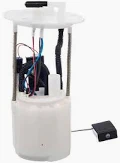A fuel pump, as the name suggests is vital to engine operation in that it ensures an appropriate level of pressurized flow from a gas tank through to your car's motor. When the fuel pump stops working, it can have devastating consequences on your engine performance. Based on a 2021 study by the Automotive Research Association of India, fuel pump incorrect operation can lower gas flow as much as up to30% so right here are some symptoms due to faulty performance chain is poor acceleration stalling and engine misfires. This has an immediate effect on the engine power and efficiency, reducing output noticeably.
It controls and maintains the right level of fuel pressure in the fuel injection system. The air-fuel mixture must be delivered to the engine's combustion chamber at correct percent, pressure is important in order to maintain a sufficient level of fuel pressures. A traditional fuel injection system may operate under pressures which can vary in the range of 40 to about 70 psi depending on the vehicle. When the fuel pump cannot hold pressure, it upsets the air-fuel ratio and results in either a lean or rich condition which leads to engine ping, lack of power, efficiency loss or even emissions control issues.
For instance, knowing what “fuel pressure regulator,” “fuel injection system” and its related terms as well as how much they matter in combustion efficiency will explain to you why the fuel pump literally can control an engine's performance. For example, the fuel pressure regulator maintains correct pressure and a precisely metered amount of fuel is placed into the engine with its fuel injection system. Should the fuel pump not supply enough high-pressure juice for these parts, they will be severely damaged and impair full engine performance.
One of the most common scenarios in which fuel pump problems degrade engine performance was when Toyota had to recall over a million vehicles because its faulty fuel pumps caused issues with engine function back in 2018. The flaw led to engines cutting out all of a sudden, thus making it dangerous for the driver and even affect engine durability. This is an example of just how vital a fuel pump can be whenever it comes down to driveability and also security for your engine.

Elon musk once said, “Engineering is about finding the sweet spot between performance and reliability. A potent, high-performance engine needs to be fed fuel effectively in order to remain powerful and reliable, with the fuel pump serving as one of the critical elements. No matter how advanced your engine is, if the fuel pump does not work properly, there will be no peak performance.
Then a question, “Can fuel pump performance affect engine?” is easily answered with data. In a report from Car and Driver, fuel pump failures have been shown to cause an increase in gas usage by nearly 15%, meaning that consumers are taking more visits at the pump; while also noticing a loss of power out of their engine. That is because the engine must work as much or harder to run on a lean air-to-fuel mixture and excess fuel flow rates together, which also puts added stress on more components in it.
The cost factor will determine how important it is to keep your fuel pump healthy. It costs about 400$-600$, for a slight adjustment in installation due to variations between car models and repaire labor. But a damaged fuel pump can cause engine issues, like ruined pistons or injectors that may cost more than $1K.
Engine performanceIf the engine is having trouble with acceleration and a high number of stalls, serious owners are advised to first check for signs that may indicate its fuel pump. Having an effective fuel pump will not only make the engine performs better but it also reliefs you of making countless visits to repair shops thus reduces your car life. In order to have a high-efficient and reliable engine, fuel pressure is the key factor as for new technology of Fuel Pump will improve due time.
